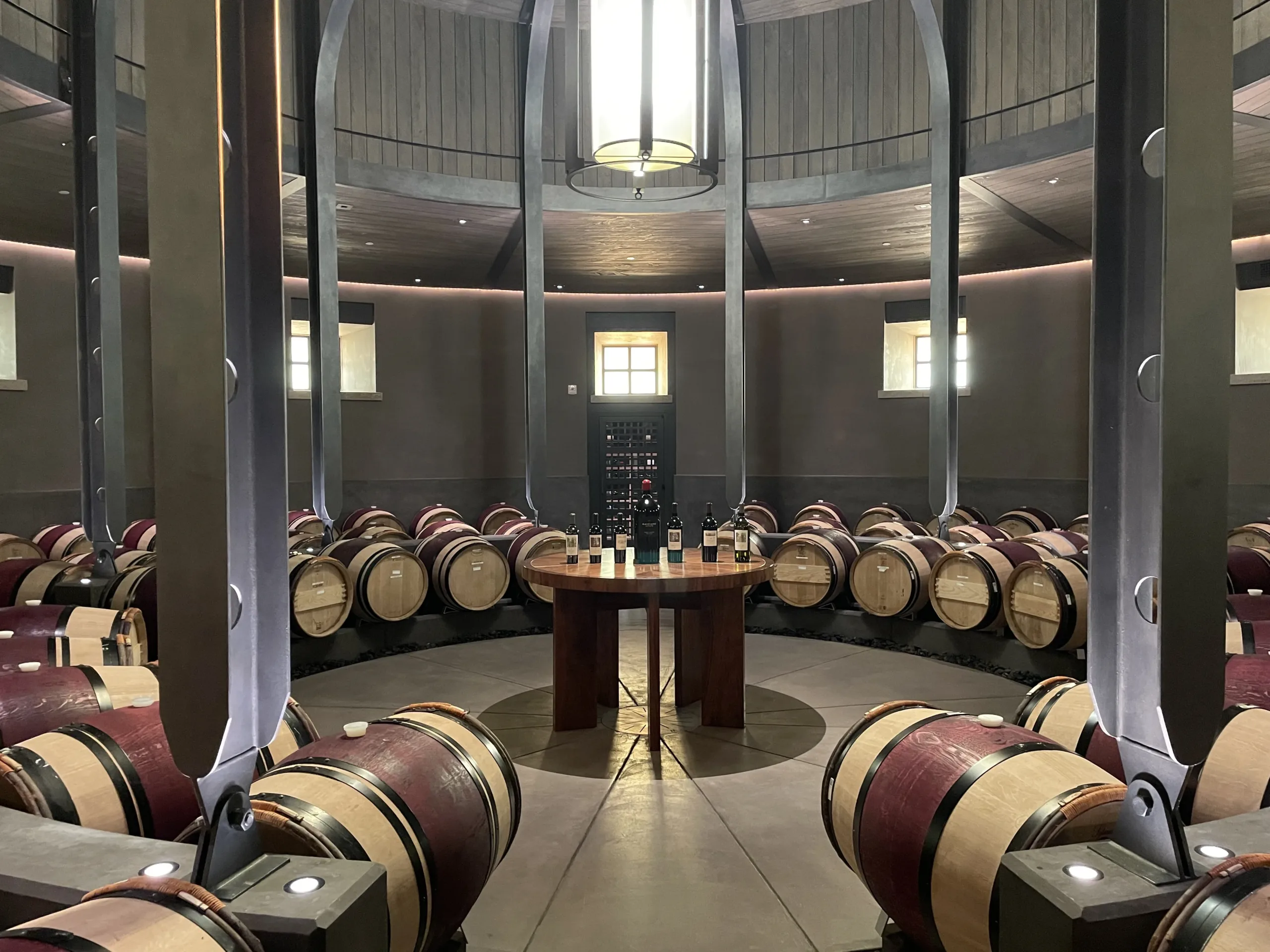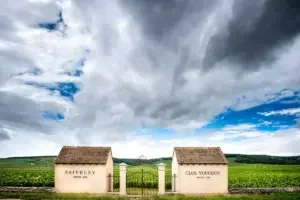Almost certainly, one of the formative tastes in any young Jewish American’s life is the sickly sweet, Concord grapeyness of Manischewitz wine, ritually sipped at a Passover seder. Even for me, a particularly unobservant Jew, this was most certainly my first taste of wine, and remains an indelible, if not particularly pleasant, sense memory. It took many years for me to realize those flavors were not what wine actually tasted like.
For the longest time, the options available for kosher wine in America were extremely limited. Then in the late 70s and early 80s along came Hagafen and Baron Herzog, two wineries unapologetically aiming to raise the bar for kosher wine in California. Both were remarkably successful in doing so (and Herzog keeps expanding). Hagafen’s top efforts, in particular, were excellent wines.
The real revolution in American kosher wine came in 2003 when Jeff Morgan and his business partner Leslie Rudd began the brand Covenant, aiming to make a Napa Cabernet that was first a fine wine, but also happened to be kosher. They began with 500 cases of kosher Cabernet, added a Chardonnay in 2011, and kept growing.
For more than a decade that seemed to be all there was to California kosher wine. But then in the course of a conversation with a Napa winemaker, I heard about someone making another kosher wine in Napa, and I began to dig, which led to the discovery of a whole new wave of kosher wines being made in California. I wrote about this phenomenon for Jancis Robinson in 2021 but I hadn’t yet tasted the wines themselves.
It took me a little while but I recently managed to get my hands on a few of them.
What is Kosher Wine?
Here’s a quick primer for those who may not know what is involved in making a wine kosher. Like all kosher foodstuffs, a wine must first and foremost be certified kosher by an official body, which usually means either the Orthodox Union or the Organized Kashrut Laboratories (aka OK Labs).
In order for a wine to be certified kosher, it must be made, start to finish, by sabbath-observant Jews (shomer shabbat), and not have been intentionally touched or moved by anyone who doesn’t meet that criteria. In practice, this means that from when the grapes are first tipped into a destemmer or a vat to the moment the capsule goes on the bottle, everything must be done by the shomer shabbat. Surprise inspections by the certifying body aren’t uncommon.
Additionally, nothing can be added to the wine that itself is not certified kosher. In practice, this means many kosher winemakers use native yeasts and no additives, though kosher-certified wine yeast is available for those who want to inoculate their fermentations. Also, if kosher winemakers want to make sure their wine is suitable for use at Passover, they need to make sure that no wheat paste is used in the construction of their barrels (it often is, but can be optionally replaced with a non-wheat sealant).
There’s one more aspect to kosher wine that often leads to some confusion, and that is the concept of mevushal versus non-mevushal wine. Mevushal wine remains kosher regardless of who opens and serves the wine, a useful concept in the context of restaurants and other situations outside the home where there is no guarantee that the people serving the wine are observant Jews.
In order for a wine to be mevushal, the finished wine must be effectively pasteurized at a temperature of around 190˚F, a process that negatively impacts wine quality in my experience. Much of the early kosher wine made in America was mevushal, leading to the mistaken impression that in order to be kosher wine had to be “boiled” and that kosher wine could never match the quality levels of non-kosher wine.
Most of the time, anyone who is orthodox enough to require truly kosher wine will open and serve the bottle themselves (or can easily arrange to do so). This is why almost every modern kosher wine project opts to preserve the freshness of its flavors and make non-mevushal wine.
There are plenty of other minutiae and slightly onerous strictures involved in the process of making kosher wine. For instance, outside of Israel, the people making the wine must be employed by the certifying body, not the winery itself. Wine containers must be double-sealed to avoid the possibility of access by the non-shomer shabbat. Moving the wine includes things like taking a sample from a barrel or tank, or even turning on a pump. This may not seem like a problem until you remember that no work can be done on the sabbath or high holidays, which means if you want to process grapes or do a pump-over on a Saturday, you’re out of luck (though automatic pump-overs are a thing if you’ve got the right gear).
Somewhat inconveniently, Rosh Hashanah, the Jewish New Year falls right in the middle of September, which often makes for some tricky scheduling when it comes to harvest.
Nonetheless, provided all parties involved are diligent and dedicated, making kosher wine isn’t terribly difficult. What’s more, there certainly appears to be a market for it, something that the Bordelaise seemed to figure out well before California did. A number of Grand Cru Bordeaux estates make kosher versions of their wines, such as Château d’Angelus, Château Smith Haut Lafitte, and Château Valandraud.
Kosher in Napa and Beyond
California, however, is catching up fast. Pretty much every time I think I have a handle on all the new kosher wine projects going on in California, I discover a new one. Most seem to be small production affairs attached to an existing conventional winery and are content to fly below the radar, selling their few hundred cases to a mailing list of orthodox customers in the know.
Some, however, are projects dedicated entirely to kosher wine, often with a broad portfolio of bottlings resembling any other artisan California producer.
That said, there are only three or four kosher winemakers in California who possess the combination of winemaking knowledge and shomer shabbat status required to produce a certified kosher wine. Needless to say, they’re kept quite busy these days.
Here, then, are some of the best kosher wine projects I’ve managed to track down in California and my thoughts on their wines.
I’ve tried to provide links to purchase these wines where I know they are available online, but if you are really interested in these wines you should simply reach out to the producer directly.
Marciano Estate
Marciano Estate represents a perfect example of a Napa jewel-box winery. Founded by Maurice Marciano, one of the founders of the GUESS clothing company, the winery is everything you’d expect from a no-expense-spared approach to a Napa brand. Twenty meticulously planted and farmed acres by David Abreu. Check. Stunning winery designed by Howard Backen. Check. First vintages made by consulting winemaker Andy Erickson with guidance from enologist Michel Rolland. Check. Frankly, there’s not much more you could do in pursuit of superlatives in Napa Valley.
Marciano’s father was the leading rabbi in the French city of Marseille, and a good portion of the family is quite orthodox. When asked what his motivation was for beginning a kosher program, he reportedly said, “I’m just tired of drinking bad kosher wine at the holidays.”
Marciano Estate brought on an entirely new staff in the last couple of months, including French winemaker Bastien Lucas who trained in Bordeaux and recently worked at Alpha Omega winery. Their new consulting winemaker is Benoit Touquette.
The winery produces about 2400 cases of wine per year, with roughly 40% of that being kosher.
Tasting Notes
2022 Marciano Estate Kosher Sauvignon Blanc, Napa Valley, California
Light greenish gold in the glass, this wine smells of bright lemon curd and apples. In the mouth, apple and lemon flavors have a rich intensity and a touch of alcoholic heat. Has about 8% Sauvignon Musque blended in. There’s a light grip. Certified kosher, non-mevushal. 14.1% alcohol. Score: between 8.5 and 9. Cost: $135.
2013 Marciano Estate “Terra Gratia” Kosher Red Blend, Napa Valley, California
Dark garnet in the glass with ruby highlights this wine smells of cocoa powder, roasted figs, and black cherry. In the mouth, flavors of black cherry, cola, cocoa powder, raisins, and cedar are rich and ripe. Beautiful supple tannins, excellent acidity, and a faint salinity creeps into the finish. A blend of 39% Cabernet Sauvignon, 15% Cabernet Franc, 31% Merlot, and 15% Petit Verdot. Certified kosher, non-mevushal. 14.8% alcohol. 335 cases made Score: between 9 and 9.5.
2021 Marciano Estate “Terra Gratia” Kosher Red Blend, Napa Valley, California
Dark garnet in the glass, this wine smells of bright cherry fruit with hints of cola and chocolate. In the mouth, juicy black cherry and cola flavors have a nice brightness to them and excellent acidity that keeps things juicy. Delicious with almost creamy tannins that buff the edges of the mouth. 96% Cabernet Sauvignon, 4% Cabernet Franc. Certified kosher, non-mevushal. 14.8% alcohol. Score: between 9 and 9.5. Cost: $180. click to buy.
2021 Marciano Estate Kosher Cabernet Sauvignon, Napa Valley, California
Dark garnet in the glass, this wine smells of rich black cherry and cassis. In the mouth, black cherry and black plum flavors are rich but bright with acidity. There’s a faint licorice root bitterness that lingers in the finish, with supple, fleecy tannins that coat the mouth. Includes 4% Cabernet Franc. Certified kosher, non-mevushal. 14.8% alcohol. Score: between 9 and 9.5. Cost: $324.
Kingsmark

Leslie Rudd, a cofounder of Covenant who passed away in 2018, was something of a towering figure not only in Napa Valley but also throughout the country. From running a major national liquor distributor to owning and growing the Dean & Deluca chain of food retailers to the founding of Rudd Estate, and the creation of PRESS Restaurant, Rudd was a widely respected figure who loomed large in the life of his niece Whitney Skibell.
Skibell, the daughter of Rudd’s sister, was very close with her uncle and after his death decided she wanted to build on his vision for vine kosher wine. She reached out to Philippe Melka and Maayan Koschitzky of the superstar wine consulting firm Atelier Melka and asked if they’d be willing to make a top-tier kosher wine for her.
Koschitzky, who is Israeli and has worked in wineries in Israel, knew what was involved, and after some deliberation about whether they felt like they could make a kosher wine that was the equal of other wines in their portfolio, they accepted the commission.
Just in time to lose their entire first crop to smoke damage in the 2020 fires.
Luckily, the following year proved to be an extraordinary vintage, and so their first wine is about to be released. Skibell selected the name “Kingsmark” partially in honor of her uncle, who she says, “Made a mark everywhere he went.”
The wine is sourced from the Beckstoffer Georges III vineyard and ROY estate. Only 300 cases were made. I was originally told that the wine was going to be $300 and released this month, but apparently, both the price and release date are being rethought.
Tasting Notes
2021 Kingsmark Cabernet Sauvignon, Napa Valley, Napa, California
Inky opaque garnet in the glass, this wine smells of black cherry and cassis and floral herbs. In the mouth, sumptuous black cherry and cassis flavors mix with graphite and dried herbs. The tannins are supple and velvety, with a rich downy plushness that is quite compelling. Outstanding acidity and brightness. A massive wine, but extremely well-sculpted. 14.9% alcohol. Score: around 9.5.
Mayacamas Vineyards
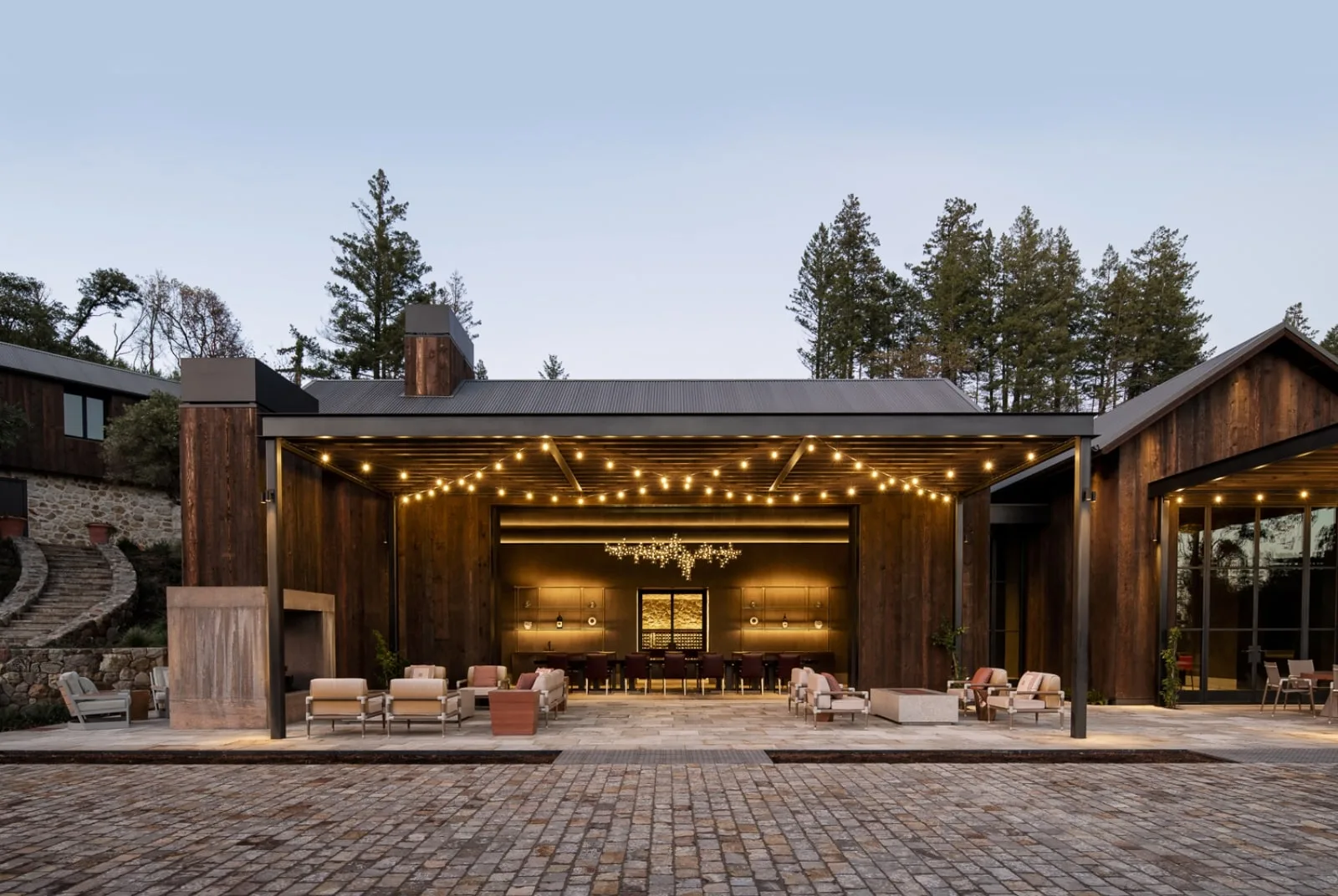
Mayacamas Vineyards is a legendary name in Napa that rarely needs any introduction to lovers of California wine. On the kosher wine front, however, it may come as something of a surprise.
The Schottenstein Family were initially partial investors in Mayacamas after Bob Travers sold the estate in 2013, and they assumed full ownership of the estate in 2017. In 2013, the Schottensteins also bought a 50% stake in Israel’s Mount Carmel winery. Jay Schottenstein is a successful executive behind a wide range of major clothing retailers, and also happens to only drink kosher wine.
According to his son Joey, the Mayacamas kosher program started up as just something for Schottenstein and his friends, but not long after took on a life of its own. The winery now produces four different kosher bottlings, a Sauvignon Blanc, a rosé, a Chardonnay, and a Cabernet Sauvignon.
The program has grown to be about 700 cases in size (fires and droughts notwithstanding) and instead of being just for insiders, the wines are now available for purchase directly from the Mayacamas website.
Mayacamas winemaker Braiden Albrect works with the kosher team to ensure that the winemaking is as close as possible to the approach used for the non-kosher wines, though he says that there’s an interesting exception.
“With our normal wines, you’re usually getting a wine representative of the entire estate, with fruit from many different sites and blocks,’ says Albrecht. “But since we’re doing a targeted pick for the Kosher program, the wine ends up being much more of a single vineyard expression.”
Tasting Notes
2022 Mayacamas Vineyards Kosher Rosé of Grenache, Mount Veeder, Napa, California
Palest baby pink in the glass, this wine smells of sweet strawberries and watermelon. In the mouth, bright and fresh watermelon and watermelon rind flavors mix with strawberries and a touch of citrus peel. Silky texture and great bright acidity. Delicious. Direct to press and then fermented in steel. Certified kosher, non-mevushal. 13.33% alcohol. Score: between 9 and 9.5. Cost: $45.
2022 Mayacamas Vineyards Kosher Sauvignon Blanc, Mount Veeder, Napa, California
Pale yellow-gold in the glass, this wine smells of green apple and passionfruit. In the mouth, gorgeously racy green apple and passionfruit flavors have a hint of more savory celery notes. Crisp and delicious. Certified kosher, non-mevushal. 13.33% alcohol. Score: between 9 and 9.5. Cost: $65.
2020 Mayacamas Vineyards Kosher Chardonnay, Mount Veeder, Napa, California
Light yellow-gold in the glass, this wine smells of flowers and lemon curd. In the mouth, lemon curd and white flowers mix with lemon pith and grapefruit. Excellent acidity and balance. Whole-cluster pressed and barrel fermented. Ages for 12 months half in large format oak and half in barriques. Roughly 10% or less new oak. Certified kosher, non-mevushal. 14% alcohol. Score: around 9. Cost: $70.
2021 Mayacamas Vineyards Kosher Chardonnay, Mount Veeder, Napa, California
Light yellow-gold in the glass, this wine smells of white flowers and lemon curd. In the mouth, lemon curd, vanilla, and lemon peel flavors have a faint kumquat flavor and a touch of bitterness in the finish. The acidity is sneaky here and builds over time. Whole-cluster pressed and barrel fermented. Ages for 12 months half in large format oak and half in barriques. Roughly 10% or less new oak. Certified kosher, non-mevushal. 13.25% alcohol. Score: between 8.5 and 9. Cost: $70.
2018 Mayacamas Vineyards Kosher Cabernet Sauvignon, Mount Veeder, Napa, California
Dark garnet in the glass, this wine smells of dark cherry and crushed herbs. In the mouth, bright black cherry and aromatic herbs mix with wet stone and a touch of wood. In the mouth, fine-grained tannins fill the mouth but exert little force on the palate while black cherry and green herbs swirl on the palate. The tannins do stiffen with time. Great acidity. 100% destemmed fruit fermented in a combination of stainless steel and concrete, then spends 30 months in mostly large-format, neutral oak. Certified kosher, non-mevushal. 14% alcohol. Score: between 9 and 9.5. Cost: $210.
2019 Mayacamas Vineyards Kosher Cabernet Sauvignon, Mount Veeder, Napa, California
Dark garnet in the glass, this wine smells of black cherry, dried flowers, and aromatic herbs. In the mouth, bright black cherry and green herbs have a bright tangy quality with tightly muscled tannins that have a micro-fleece texture and a hint of licorice root that lingers in the finish with a touch of camphor wood. 100% destemmed fruit fermented in a combination of stainless steel and concrete, then spends 30 months in mostly large-format, neutral oak. Certified kosher, non-mevushal. 14% alcohol. Score: between 9 and 9.5. Cost: $210.
Covenant
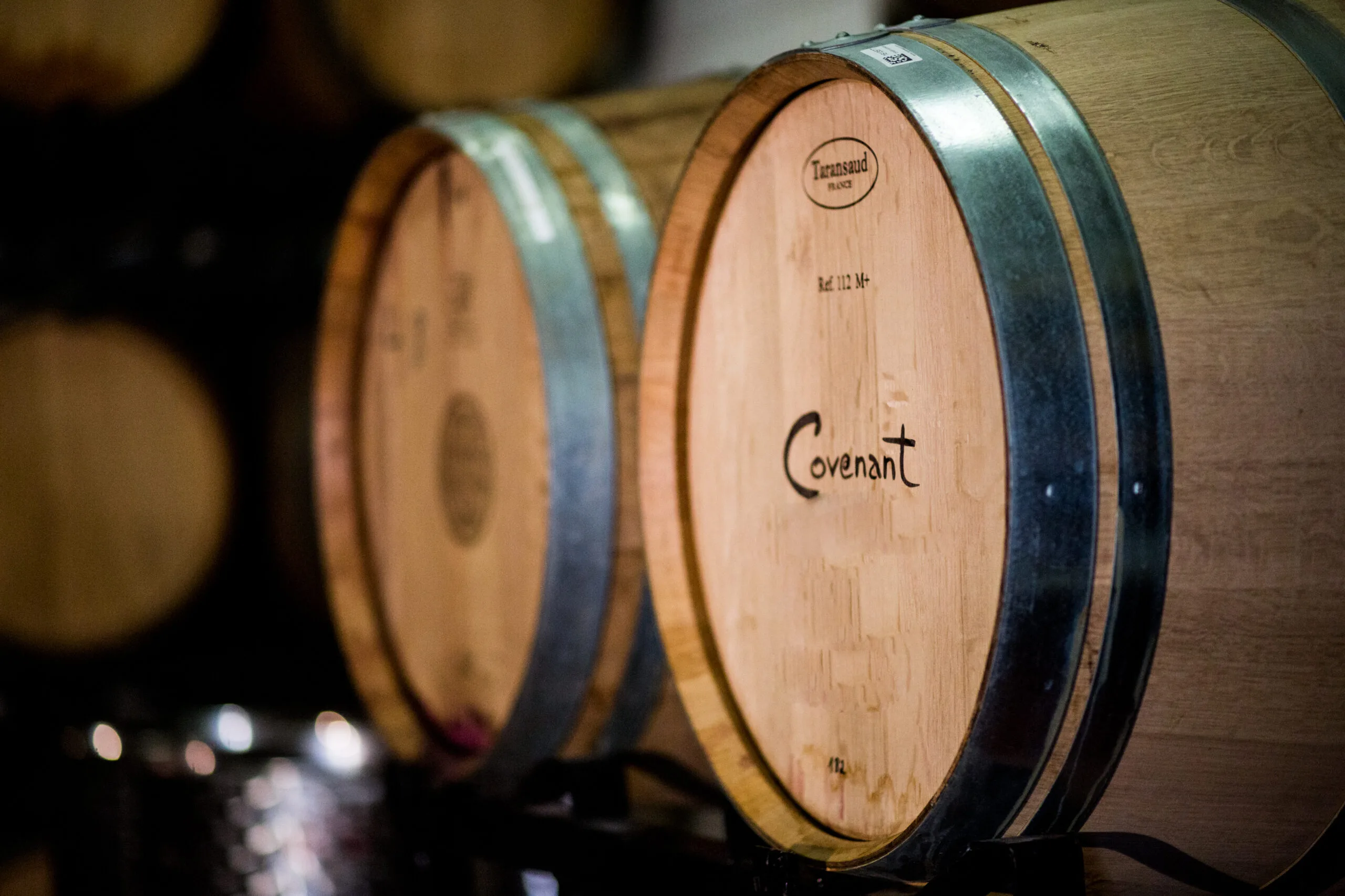
While Covenant may have begun the fine kosher wine boom, they have hardly rested on their laurels. Once a small project run first out of Herzog Winery in Napa and later a custom crush facility, Covenant has grown at least tenfold in size and now boasts an urban tasting room in Berkeley’s wine district and holds concerts in which proprietor Jeff Morgan plays saxophone in addition to serving the wide variety of wines now produced by the winery from throughout California.
The winery even began making wines in Israel in 2013.
In 2008 Morgan hired a young orthodox Jewish winemaker named Jonathan Hajdu who had just begun to explore making his own kosher wines, allowing Covenant to have an in-house, full-time shomer shabbat winemaker.
The Covenant wines continue to be ambassadors for the idea that kosher wine first has to be good wine, period.
Tasting Notes
2020 Covenant “Solomon Blanc” Sauvignon Blanc, Sonoma, California
Pale greenish gold in the glass, this wine smells of white flowers and green apples and a touch of vanilla. In the mouth, silky flavors of vanilla and green apple mix with pastry cream. Long finish with saline notes, and excellent acidity that sneaks up on you. Barrel fermented with around 20% new oak. Certified kosher, non-mevushal. 13.2% alcohol. Score: around 9. Cost: $75.
2020 Covenant “Lavan” Chardonnay, Sonoma Mountain, Sonoma, California
Pale gold in color, this wine smells of lemon pith and pastry cream. In the mouth, creamy lemon curd and pastry cream mix with pink grapefruit and a touch of apple. Good acidity. Native yeast fermented in neutral oak barrels. Battonage monthly. From a vineyard at the top of Sonoma Mountain with Clone 4 Chardonnay. Certified kosher, non-mevushal. 13.8% alcohol. Score: between 8.5 and 9. Cost: $46. click to buy.
2018 Covenant “Zahav” Late Harvest Chardonnay, Sonoma Mountain, Sonoma, California
Light yellow-gold in the glass, this wine smells of apricots and honey. In the mouth, golden apples and honey and a touch of apricot jam have a nice brightness thanks to good acidity. 11.7% alcohol. 375ml bottle. Score: between 8.5 and 9. Cost: $30. click to buy.
2021 Covenant Wines “Landsman – Mahoney Vineyard” Pinot Noir, Carneros, Sonoma, California
Medium garnet in the glass, this wine smells of cherry and raspberry. In the mouth, ripe cherry and cedar flavors mix with dried herbs and a touch of earth. Notes of citrus peel and sour cherry linger in the finish. Good acidity and balance, if a little ripe for my tastes. Certified kosher, non-mevushal. 14% alcohol. Score: around 8.5. Cost: $45. click to buy.
2020 Covenant “Landsman” Pinot Noir, Napa Valley, Napa, California
Light to medium ruby in the glass with garnet highlights, this wine smells of bright, sweet cherry fruit. In the mouth, bright cherry and a touch of dried herbs mix with a hint of citrus. Barely perceptible tannins, with just a hint of heat on the finish. Certified kosher, non-mevushal. 14% alcohol. Score: between 8.5 and 9. Cost: $40. click to buy.
2019 Covenant Wines “Red C” Red Blend, Sonoma County, California
Dark garnet in the glass, this wine smells of cherry and blackberry with hints of cedar and chocolate. There’s a hint of toasted oak in there as well, which lingers with notes of cocoa in the finish. Good acidity. A blend of Cabernet Sauvignon, Syrah, Malbec, Merlot and “a touch” of Grenache. Certified kosher, non-mevushal. 14.8% alcohol. Score: around 8.5. Cost: $50. click to buy.
2020 Covenant Wines Cabernet Sauvignon, Napa Valley, Napa California
Dark garnet in the glass, this wine smells of black cherry, tobacco, and mocha. In the mouth, cherry and cola flavors are bright with juicy acidity and backed by a muscular sheaf of fine-grained tannins. Notes of black cherry and cassis linger in the finish. Certified kosher, non-mevushal. 14.8% alcohol. Score: around 9. Cost: $125. click to buy.
2018 Covenant “Solomon – Lot 70” Cabernet Sauvignon, Carneros, Napa, California
Dark garnet in the glass, this wine smells of rich black cherry fruit and a hint of tobacco. In the mouth, gorgeously bright cherry, cola, and black cherry fruit are fantastically juicy and shot through with fleecy tannins and a hint of green herbs. There’s a small single-digit percentage of Cabernet Franc cofermented with this wine. Grows 50 yards from Pinot Noir. But it’s Carneros Cabernet. It’s a thing. And it’s damn tasty. Certified kosher, non-mevushal. 14.5% alcohol. Score: between 9 and 9.5. Cost: $200. click to buy.
2004 Covenant Cabernet Sauvignon, Napa, California
Dark garnet in the glass, this wine smells of soft leather and cherry plus a touch of green herbs and camphor. In the mouth, flavors of black cherry, leather, and earth mix with green herbs. Notes of licorice root linger in the finish. This is in pretty great shape. The fruit came from Larkmead Vineyards. Unfined, unfiltered. Certified kosher, non-mevushal. 14.4% alcohol. Score: around 9.
2020 Covenant Wines “Landsman – Robert Rae Vineyard” Syrah, Sta. Rita Hills, Santa Barbara, California
Medium to dark garnet in the glass, this wine smells of wet iron, blackberries, and blackcurrants. In the mouth, faintly saline flavors of iron and blackberry have a decidedly stony, savory quality, as powdery tannins coat the mouth, and hints of dried fennel seeds linger in the finish. Certified kosher, non-mevushal. 14.5% alcohol. Score: between 8.5 and 9. Cost: $45.
2020 Covenant “Bien Nacido Vineyard” Syrah, Santa Maria Valley, Santa Barbara, California
Dark purple in the glass, this wine smells of smoked meat and blueberry and white pepper. In the mouth, blueberry and blackberry fruit with some saline notes mix with white pepper and meaty umami fruit. Lightly leathery tannins. Great acidity. Quite delicious. Certified kosher, non-mevushal. Tasted as barrel sample before bottling. 14.8% alcohol. Score: between 9 and 9.5. Cost: $85. click to buy.
Hajdu Wines
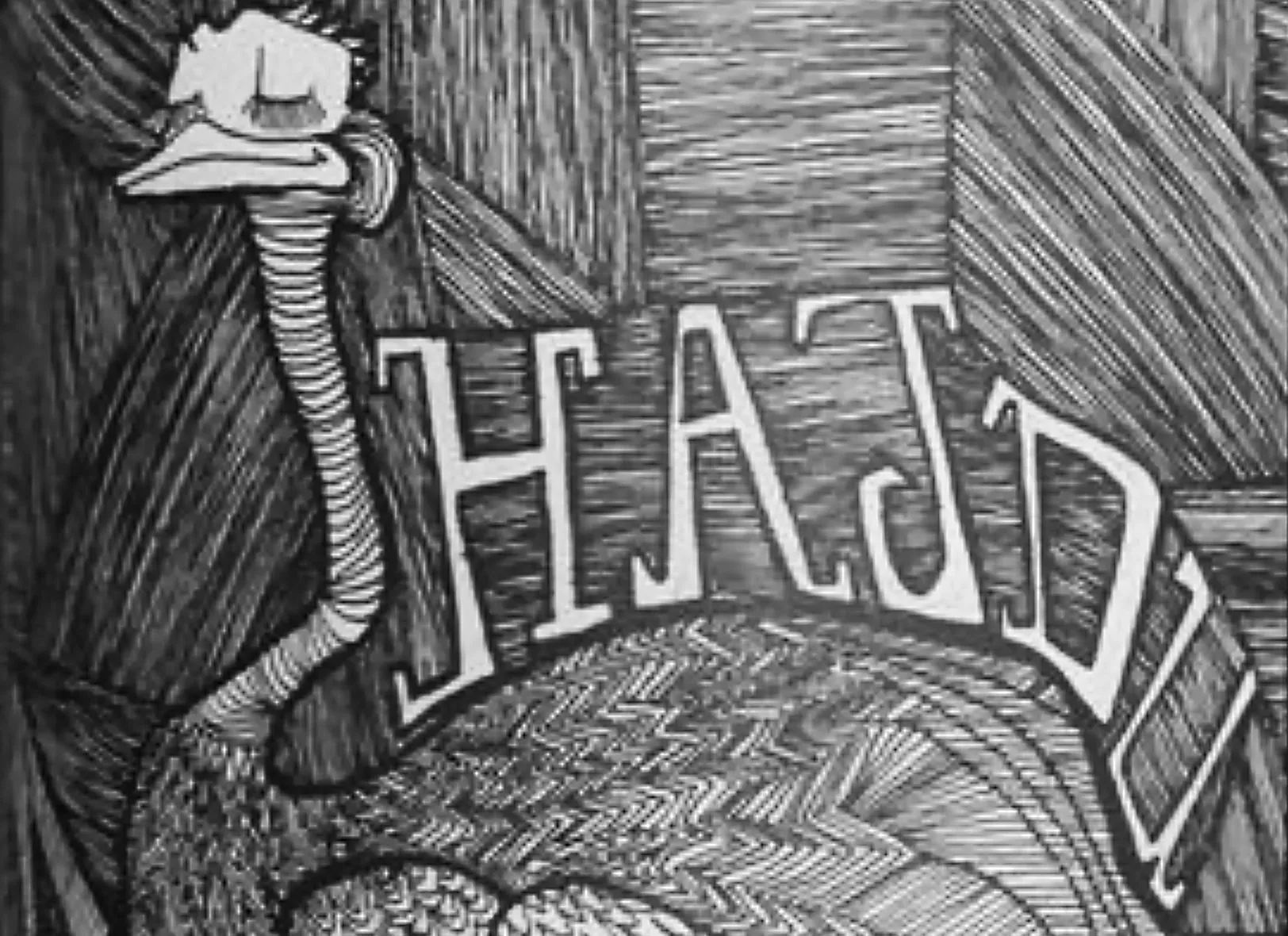
In addition to being the full-time winemaker at Covenant, Jonathan Hajdu runs his own small label called Hajdu Wines which he makes at Covenant’s facility and runs out of his Oakland home, with whimsical label art created by his wife Ellie, who is a professional puppet designer.
But don’t let the whimsical art (or the frequent appearance of the word “Brobdinagian” on back labels) fool you into thinking these are frivolous wines.
Hajdu fell in love with wine at a young age and worked at a number of wineries before landing his full-time gig at Covenant.
Tasting Notes
2022 Hajdu Wines Pinot Blanc, Anderson Valley, Mendocino, California
Light yellow-gold in the glass, this wine smells of lemon curd and lemon pith. In the mouth, vibrant acidity brings flavors of lemon peel, lemon pith, and lemon curd to life. Juicy, mouthwatering, and delicious. Barrel fermented, native yeast, malolactic inhibited. Certified kosher, non-mevushal. 12.5% alcohol. 300 cases made. Score: between 9 and 9.5. Cost: $30. click to buy.
2021 Hajdu Wines Pinot Blanc, Anderson Valley, Mendocino, California
Light yellow gold in the glass, this wine smells of white flowers, a touch of resin, and citrus pith. Lean Meyer lemon and white flowers mix with a hint of Asian pear and a light salinity. Clean and bright and mouthwatering. Certified kosher, non-mevushal. 12.5% alcohol. 200 cases made. Score: between 9 and 9.5. Cost: $30. click to buy.
2022 Hajdu Wines Rosé of Pinot Noir, California
Light pink in the glass with a hint of orange, this wine smells of citrus peel and unripe strawberries. In the mouth, tart strawberry and citrus peel flavors have a nice brightness thanks to excellent acidity. Mostly Pinot Noir, whole cluster pressed, barrel fermented, and aged in neutral oak. But some bits and bobs of saignee from various other red wine lots, including Zinfandel and Barbera. Certified kosher, non-mevushal. 13.5% alcohol. 200 cases made. Score: around 8.5. Cost: $32. click to buy.
2022 Hajdu Wines Petite Sirah, California
Inky garnet in the glass, this wine smells of smoky blueberry and blackberry fruit. In the mouth, rich and powerful flavors of blackberry, licorice, and sawdust are wrapped in fine-grained but muscular tannins. Certified kosher, non-mevushal. 14.8% alcohol. 250 cases made. Score: around 8.5. Cost: $50. click to buy.
2021 Hajdu Wines Barbera, Sierra Foothills, California
Medium garnet in the glass, this wine smells of mulled orange peel and aromatic herbs. In the mouth, juicy orange peel, leather, and dried herbs have a brightness thanks to fantastic acidity. There’s a faint heat in the finish. 14.5% alcohol. Certified kosher, non-mevushal. 125 cases made. Score: around 8.5. Cost: $50. click to buy.
2021 Hajdu Wines Proprietary Red, Napa Valley, Napa, California
Dark garnet in the glass, this wine smells of rich black cherry, cocoa powder, and oak. In the mouth, black cherry and plum mix with cedar and cocoa powder. Notes of toasted oak, cherry, and chocolate linger in the finish. A blend of 90% Cabernet Sauvignon and 10% Montepulciano aged for 14 months in 40% new French oak. Certified kosher, non-mevushal. 14.5% alcohol. 250 cases made. Score: between 8.5 and 9. Cost: $85. click to buy.
2021 Hajdu Wines Teroldego, Clarksburg, California
Dark garnet in the glass, this wine smells of black cherry and aromatic herbs. In the mouth, juicy black cherry and aromatic herbs, including lavender and dried oregano, mix with citrus peel and juicy acidity. Lightly grippy tannins. 14.5% alcohol. Certified kosher, non-mevushal. 100 cases made. Score: between 8.5 and 9. Cost: $50.
2017 Hajdu Wines Sangiovese, San Benito County, Central Coast, California
Medium to dark garnet in the glass, this wine smells of cherry and a hint of incense. In the mouth, cherry and cedar flavors mix with a hint of mulling spices. Excellent acidity, with some alcoholic heat, though, in the finish. Certified kosher, non-mevushal. 14.5% alcohol. 75 cases made. Score: around 8.5.
The post The New Wave of Luxury California Kosher Wine appeared first on Vinography.
This Article was originally published on Vinography

